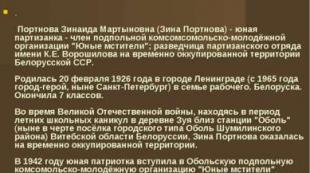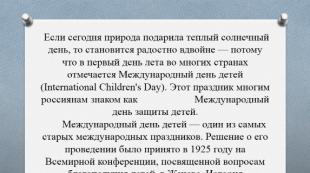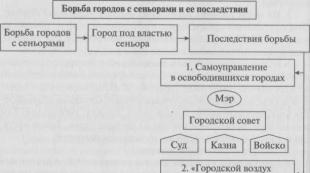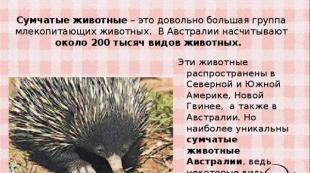Presentation about tailor's zine. Presentation about zine the tailor's hero of the Soviet Union. The work can be used for lessons and reports on the subject "History"
slide 1
slide 2
 . Portnova Zinaida Martynovna (Zina Portnova) - a young partisan - a member of the underground Komsomol youth organization "Young Avengers"; intelligence officer of the partisan detachment named after K.E. Voroshilov in the temporarily occupied territory of the Byelorussian SSR. She was born on February 20, 1926 in the city of Leningrad (since 1965, the hero city, now St. Petersburg) in a working class family. Belarusian. Graduated from 7 classes. During the Great Patriotic War, while during the summer school holidays in the village of Zuya near the Obol station (now within the boundaries of the urban-type settlement of Obol, Shumilinsky district) of the Vitebsk region of Belarus, Zina Portnova ended up in the temporarily occupied territory. In 1942, the young patriot joined the Obol underground Komsomol youth organization "Young Avengers" (headed by Hero of the Soviet Union E.S. Zenkova), and actively participated in the distribution of leaflets among the population and sabotage against the Nazi invaders
. Portnova Zinaida Martynovna (Zina Portnova) - a young partisan - a member of the underground Komsomol youth organization "Young Avengers"; intelligence officer of the partisan detachment named after K.E. Voroshilov in the temporarily occupied territory of the Byelorussian SSR. She was born on February 20, 1926 in the city of Leningrad (since 1965, the hero city, now St. Petersburg) in a working class family. Belarusian. Graduated from 7 classes. During the Great Patriotic War, while during the summer school holidays in the village of Zuya near the Obol station (now within the boundaries of the urban-type settlement of Obol, Shumilinsky district) of the Vitebsk region of Belarus, Zina Portnova ended up in the temporarily occupied territory. In 1942, the young patriot joined the Obol underground Komsomol youth organization "Young Avengers" (headed by Hero of the Soviet Union E.S. Zenkova), and actively participated in the distribution of leaflets among the population and sabotage against the Nazi invaders
slide 3
 Since August 1943, Komsomol member Zina Portnova has been a scout of the partisan detachment named after K.E. Voroshilov. In December 1943, she was given the task of uncovering the reasons for the failure of the Young Avengers organization and establishing contact with the underground. Upon returning to the detachment, Zina was arrested. During the interrogation, the brave girl grabbed the pistol of the fascist investigator from the table, shot him and two more Nazis, tried to escape, but was captured and brutally tortured in January 1944 in the village of Goryany, now the Shumilinsky district of the Vitebsk region of Belarus.
Since August 1943, Komsomol member Zina Portnova has been a scout of the partisan detachment named after K.E. Voroshilov. In December 1943, she was given the task of uncovering the reasons for the failure of the Young Avengers organization and establishing contact with the underground. Upon returning to the detachment, Zina was arrested. During the interrogation, the brave girl grabbed the pistol of the fascist investigator from the table, shot him and two more Nazis, tried to escape, but was captured and brutally tortured in January 1944 in the village of Goryany, now the Shumilinsky district of the Vitebsk region of Belarus.
slide 4
 For her heroism in the fight against the Nazi invaders, by the Decree of the Presidium of the Supreme Soviet of the USSR of July 1, 1958, Portnova Zinaida Martynovna was posthumously awarded the title of Hero of the Soviet Union. Awarded the Order of Lenin.
For her heroism in the fight against the Nazi invaders, by the Decree of the Presidium of the Supreme Soviet of the USSR of July 1, 1958, Portnova Zinaida Martynovna was posthumously awarded the title of Hero of the Soviet Union. Awarded the Order of Lenin.
slide 5
 In 1969, in the village of Zuya, on the house where Zina Portnova lived from 1941 to 1943, a memorial plaque was opened. On the highway "Vitebsk - Polotsk" the Museum of Komsomol Glory and the school are named after her. Many pioneer squads and detachments in the schools of Belarus bore the name of the young Heroine. A school in the urban-type settlement of Obol, a street in the hero city of Leningrad, and a motor ship are named after Zina Portnova. In the capital of Belarus - the hero city of Minsk, a bust of Zina Portnova was erected, and an obelisk near the village of Obol.
In 1969, in the village of Zuya, on the house where Zina Portnova lived from 1941 to 1943, a memorial plaque was opened. On the highway "Vitebsk - Polotsk" the Museum of Komsomol Glory and the school are named after her. Many pioneer squads and detachments in the schools of Belarus bore the name of the young Heroine. A school in the urban-type settlement of Obol, a street in the hero city of Leningrad, and a motor ship are named after Zina Portnova. In the capital of Belarus - the hero city of Minsk, a bust of Zina Portnova was erected, and an obelisk near the village of Obol.
To view a presentation with pictures, design, and slides, download its file and open it in PowerPoint on your computer.
Text content of presentation slides: The Great Patriotic War (1941–1945) Pioneer Heroes of the Great Patriotic War Pioneer Heroes Zina Portnova Childhood Born February 20, 1926 in Leningrad. She studied at an ordinary city school No. 385. In June 1941, seventh-grader Zina and her sister Galya went on vacation to their grandmother in Belarus, to the village of Zuya near the Obol station in the Vitebsk region. There they found the war.
"Young Avengers" When the underground Komsomol organization "Young Avengers" was organized in the city, Portnova became a member of it. The "Avengers" not only distributed and posted leaflets, but also obtained information for the partisans about the actions of the Germans. The feat of ZinaPortnovaPortnova managed to get a job in a German canteen for personnel. After working there for a while, she managed to carry out a cruel but effective operation - she poisoned food. More than 100 Germans suffered. Interrogation and escape Since August 1943, the Komsomol member Zina Portnova was a scout of the partisan detachment named after K.E. Voroshilov. In December 1943, returning from a mission to find out the reasons for the failure of the Young Avengers organization, she was captured in the village of Mostishche. At one of the interrogations at the Gestapo, she grabbed the investigator’s pistol from the table, shot him and two more Nazis, tried to escape, was captured. Death On the morning of January 13, 1944, the Nazis brought to execution a crippled, gray-haired and blind girl. She walked, stumbling barefoot, through the snow. She was shot in a ravine next to the railway, the body was left unburied. AwardBy the Decree of the Presidium of the Supreme Soviet of the USSR of July 1, 1958, Zinaida Martynovna Portnova was posthumously awarded the title of Hero of the Soviet Union The name of Zina Portnova was given to a street in the Kirovsky district of St. Petersburg
In the urban village of Obol (Belarus): - there is Zina Portnova street; - the school is named after Zina Portnova, a bust and a memorial plaque are installed in the foyer of this school; - the museum of the underground organization "Young Avengers" operates and a bust is installed, - a bust has been preserved on Nina Azolina street the house where Zina Portnova lived, on which a memorial plaque is installed. On the A215 highway in the urban village of Obol (Belarus), there is a memorial stele, which lists the active members of the Obol underground group, including Zina Portnova. On the alley of Heroes in front of the Shumilinsky Local History Museum, a portrait and the name of Z. M. Portnova. Zina Portnova was officially ranked among the "pioneer heroes" of the Soviet Union. In 1978, an artistic stamped envelope dedicated to the heroine was published. The monument to Zina Portnova in the village of Yagodnoye, near Tolyatti, is the territory of the former pioneer camp "Scarlet Sails".
Description of the presentation on individual slides:
1 slide
Description of the slide:
2 slide
Description of the slide:
A native of Leningrad, Zina Portnova was born in 1926 and before the war led the ordinary life of a Soviet girl. For the summer school holidays, the parents sent Zina, along with her younger sister Galya, to her grandmother in the Vitebsk region, in the village of Zui, Shumilinsky district. After the sudden attack of fascist Germany on the USSR, the threat of occupation immediately hung over the Vitebsk region. The grandmother's attempt to send her granddaughters home, to Leningrad, failed - the Germans blocked all roads. So, the girl remained in the occupied territory.
3 slide
Description of the slide:
Zina Portnova, a young underground partisan, a pioneer who died at the age of 17 by the death of the brave. The fate of the girl strikes with its tragedy anyone who learns the story of her feat and martyrdom. A native of Leningrad, Zina Portnova was born in 1926 and before the war led the ordinary life of a Soviet girl. For the summer school holidays, the parents sent Zina, along with her younger sister Galya, to her grandmother in the Vitebsk region, in the village of Zui, Shumilinsky district. After the sudden attack of fascist Germany on the USSR, the threat of occupation immediately hung over the Vitebsk region. The grandmother's attempt to send her granddaughters home, to Leningrad, failed - the Germans blocked all roads. So, the girl remained in the occupied territory.
4 slide
Description of the slide:
Zina Portnova, fulfilling the instructions of the partisan detachment, tried to get in touch with the escaped underground workers. But the mission failed, she was identified and arrested in the village of Mostische. By that time, the Nazis already knew a lot about the role of Zina in the Young Avengers. Only her participation in the poisoning was not known. Therefore, they tried to negotiate with her so that she would hand over the surviving members of the underground. But the girl was relentless. One of the interrogations conducted in the village of Goryany ended with the fact that Zina managed to grab the investigator's pistol and shoot him and two other Germans who were present during the interrogation. The attempt to escape failed, Zina was shot in the leg. And when she tried to shoot herself with the last bullet, the gun misfired.
5 slide
Description of the slide:
In practice, children, members of the underground, began their activities with trifles: they put up anti-fascist leaflets, engaged in petty sabotage against the Germans. Fruza herself found a way out to the local partisan detachment and adult underground workers and coordinated actions with them. Gradually, the sabotage by the Young Avengers becomes more and more serious. They managed to set fire to wagons with flax looted by the Nazis and sent to Germany, set fire to industrial enterprises that worked for the Nazis, and undermined them.
6 slide
Description of the slide:
One of the largest operations was the poisoning of more than a hundred German officers. And here the merit of Zina Portnova. Working as a dishwasher in the dining room, where officers sent for retraining courses ate, Zina poisoned the food. She herself then miraculously managed to avoid death and responsibility. The Germans forced her to eat from a bowl of poisoned soup. She fearlessly took the spoon and ate some of the soup, thus averting suspicion from herself. Her grandmother saved her from poison with the help of folk remedies. A strong body coped, and the girl survived.
7 slide
Description of the slide:
After this sabotage, Zina Portnova went to the partisan detachment. Here she was accepted into the Komsomol. In August 1943, a traitor introduced into the underground of the Young Avengers surrenders all members of the organization. Only Fruza Zenkova and several young underground workers manage to escape. After numerous tortures and interrogations, in October 1943, thirty boys and girls were executed by the Nazis.
8 slide
Download video and cut mp3 - we make it easy!
Our site is a great tool for entertainment and recreation! You can always view and download online videos, funny videos, hidden camera videos, feature films, documentaries, amateur and home videos, music videos, videos about football, sports, accidents and disasters, humor, music, cartoons, anime, series and many other videos completely free and without registration. Convert this video to mp3 and other formats: mp3, aac, m4a, ogg, wma, mp4, 3gp, avi, flv, mpg and wmv. Online Radio is radio stations to choose from by country, style and quality. Online Jokes are popular jokes to choose from by style. Cutting mp3 to ringtones online. Converter video to mp3 and other formats. Online TV - these are popular TV channels to choose from. Broadcasting of TV channels is absolutely free in real time - broadcast online.
Details Created on 03/04/2015 09:01 Updated on 09/15/2015 02:28 PM
PortnovaZinaida Martynovna(20.02.1926-10.01.1944) - pioneer hero, Soviet underground worker, partisan, member of the underground organization "Young Avengers", scout of the partisan detachment named after K. E. Voroshilov in the territory of the Byelorussian SSR occupied by the Nazis. Member of the Komsomol since 1943. Hero of the Soviet Union.
Zinaida was born on February 20 in the city of Leningrad in a working class family. Belarusian by nationality. Graduated from 7 classes. At the beginning of June 1941, she arrived for school holidays in the village of Zui, near the Obol station of the Shumilinsky district of the Vitebsk region. After the Nazis invaded the territory of the USSR, Zina Portnova ended up in the occupied territory. She did not want to leave with the refugees, so she decided to stay in the city of Obol.
Since 1942, a member of the Obol underground organization "Young Avengers", led by the future Hero of the Soviet Union E. S. Zenkova. From the first days of the occupation, the boys and girls began to act decisively. The "Young Avengers" distributed and posted anti-fascist leaflets, and also obtained information for the Soviet partisans about the actions of the German troops. With the help of this organization, it was possible to arrange a series of sabotage on the railway. They blew up a pumping station, which delayed the sending of ten fascist echelons to the front. Distracting the enemy, the Avengers destroyed bridges and highways, blew up a local power plant, disabled a couple of trucks, and burned a flax mill.
Working in the canteen of retraining courses for German officers, she poisoned food at the direction of the underground (more than a hundred officers died). In response, the Nazis unleashed a wave of mass terror on the city. During the proceedings, wanting to prove to the Germans her innocence, she tried poisoned soup. Miraculously, she survived. Zina was saved from death by a strong body and a grandmother who managed to mitigate the effect of the poison with folk remedies. The partisans understood that Zina could no longer be in the village, taking her to his detachment. Grandma and Zina's younger sister hid with relatives in another village.
In August 1943, Zina became a scout of the partisan detachment named after. K. E. Voroshilova. The girl is involved in undermining the echelons. The Obol underground in 1943 was practically defeated. With the help of provocateurs, the Gestapo collected all the necessary information, and also carried out mass arrests. The command of the partisan detachment ordered Portnova to establish contact with the survivors. She managed to establish a connection, but she did not report to the detachment about it. Having found out the reasons for the failure of the Young Avengers organization and already returning back, in the village of Mostische, Zina was identified by a certain Anna Khrapovitskaya, who immediately informed the police. The police detained the girl and transported her to Obol. There, the Gestapo took a close look at her, since she was listed as a suspect in sabotage in the dining room.
“The Gestapo man went to the window. And Zina, rushing to the table, grabbed a pistol. Obviously sensing a rustle, the officer turned around impulsively, but the weapon was already in her hand. She pulled the trigger. For some reason I didn't hear the shot. I only saw how the German, clutching his chest with his hands, fell to the floor, and the second, who was sitting at the side table, jumped up from his chair and hastily unfastened the holster of his revolver. She pointed the gun at him as well. Again, almost without aiming, she pulled the trigger. Rushing to the exit, Zina yanked open the door, jumped out into the next room and from there onto the porch. There she almost point-blank shot at the sentry. Running out of the building of the commandant's office, Portnova rushed down the path in a whirlwind.
"If only I could run to the river," the girl thought. But the sound of the chase was heard from behind ... “Why don’t they shoot?” The surface of the water seemed to be quite near. And beyond the river was a forest. She heard the sound of machine gun fire, and something sharp pierced her leg. Zina fell on the river sand. She still had enough strength, slightly rising, to shoot ... She saved the last bullet for herself.
When the Germans ran up very close, she decided that it was all over, and pointed the gun to her chest and pulled the trigger. But the shot did not follow: a misfire. The fascist knocked the pistol out of her weakening hands.
The Germans had no doubts about the girl's participation in the underground, so they did not interrogate her, but simply tortured her methodically. The torture lasted for more than a month. They were interrogated, as a rule, at night. She was promised to save her life, if only the young partisan would confess everything, name all the underground fighters and partisans known to her. And again, the Gestapo met with the unshakable firmness of this stubborn girl, who in their protocols was called the “Soviet bandit,” which surprised them. However, Zina did not give up the names of other underground workers. In early January, it became known in the Polotsk prison that a young partisan was sentenced to death.
“... The morning came, frosty and sunny. Sentenced to death, there were six of them, they were taken to the courtyard of the prison. One of the comrades grabbed Zina by the arms and helped her to go. The prison wall, surrounded by three rows of barbed wire, had been crowded with old men, women and children since early morning. Some brought packages to the arrested, others expected that among the prisoners who were taken to work, they would be able to see their loved ones. Among these people stood a boy in worn-out felt boots and a quilted jacket torn to shreds. A wagon with a barrel drove along a street rolled with white snowdrifts - water was brought to the prison. A few minutes later the gates opened again, and the submachine gunners escorted six people out. Among them, in a gray-haired and blind girl, the boy hardly recognized his sister ... She walked, stumbling with bare blackened feet, through the snow. A black-haired man was holding her by the shoulders. "Zina!" Lenka wanted to shout. But his voice broke off. Zina, along with other people sentenced to death, was shot on the morning of January 10, 1944 near the prison, on the square ...
By decree of the Presidium of the Supreme Soviet of the USSR of July 1, 1958, Zinaida Portnova was posthumously awarded the title of Hero of the Soviet Union with the Order of Lenin.
Awards
medal "Gold Star" of the Hero of the Soviet Union (1.07.1958)
The order of Lenin
Links
Portnova Zinaida Martynovna on the Wikipedia website
Heroes of the country. Portnova Zinaida Martnynovna









